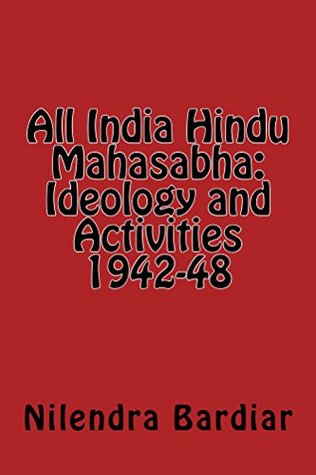Kindle Notes & Highlights
By turning the Hindu Mahasabha into a political organization, Savarkar ensured that whatever support the RSS had rendered to the Mahasabha would cease. Many RSS members were active in the Congress. And the RSS did not want to be associated with a group which would have placed it in direct opposition to the Congress.
The weakness of the Hindu Mahasabha was the more apparent because - unlike the RSS - it lacked any youth, peasant or para-military foundations. It tried to make up for this lack by appealing to the RSS, but in vain.
Kurtakoti, the Shankaracharya of Karvir Peeth, one of the leading Hindu authorities in Maharashtra,
According to him, ahimsa (non-violence) was only an action and like himsa (violence) is in itself not the highest truth in Hinduism. Rather, the motive of an action alone is what determines merit or demerit. In fact, he stated, himsa has often been advocated in religious writings (e g,
Krishna's advice to Arjuna). In other words, a worthy goal can have a wide range of means and the means that leads to success should be chosen.2
Neither Golwalkar nor Hedgewar wanted the RSS to be too closely associated with a group which would have placed it in direct opposition to the Congress. Many RSS members were active in Congress. Moreover, the RSS claimed to be above partisan attachment.
During a speech in Poona, Savarkar complimented the Hindu Rashtra Dal by stating that the consolidation of Hinduism "could not be principally preached in any other Hindu organisation." Reported in Keer, op cit, p 363.
Annarao Bhopatkar, Maharashtrian HM leader, wrote to Savarkar, "Democracy thrust the most ignorant untrained electorate all of a sudden has always proved dangerous to nations and hastened their fall."
Throughout the discussion period, the Hindu Mahasabha opposed the proposed division and sought to organize the Hindus in the anticipation of riots that
would take place over the division of India. As it had no voice in the elected councils and was ignored by the Viceroy, the HM began to turn to the idea of organizing Hindus to defend Akhand Bharat.
Many of the Rai Bahadurs in the HM protested against this decision. The
Later Savarkar perhaps in the same vein supported the independence move of the Maharaja of Travancore.
On January 24, 1947, Tiwana's government declared the Muslim League's National Guards an unlawful body. According to Chaudhri Muhammad Ali, "To keep up appearances, Rashtriya Swayamsevak Sangh, a militant Hindu organization, was also declared unlawful, but no action was taken either against the Congress volunteers, or the Sikhs who, as everyone knew, 51 In 1946 elections the Muslim League won 79 of 86 Muslim seats, Congress 51, Panthic Akali Sikhs 22, Unionists 10, and In-dependents 10. See Satya M Rai, "Partition of the Punjab", Bombay, 1965, pp 39-46, Chaudhri Muhammad Ali, "The Emergence of
...more
Vallabhbhai Patel, the Deputy Prime Minister, himself appreciated this service of the RSS and was reluctant to take strong action against it as long as the disturbances continued. He considered the RSS members patriots, even if a bit misguided.
On January 6, 1948, at Lucknow, he implored Congressmen to draw the RSS members into their own organization. "They are to be won over by 60 Lahore's DAV College was a centre used by the RSS for assembling refugees before escorting them into India. Congress with love."
It organized a group called the Hindu Sahayata Samiti in April 1947 under the presidentship of Hans Raj Gupta, who was later to become mayor of Delhi.65
Gandhi had been recommending Hindustani and the use of two scripts -- Urdu and Devnagri -- in the interests of Hindu-Muslim unity from the 1920s, in a milieu where the Hindu Mahasabha was propagating Hindi-in- Devnagri as a national language, Savarkar was purging Marathi of Persian and Urdu and Golwalkar was proclaming Sanskrit as the mother of all languages.28 Significantly, in 1942 Gandhi diverged from the Hindi Sahitya Sammelan (which espoused a Sanskrit-based Hindiin-Devnagri), stopped using it as a forum for Hindustani, and broke from it officially in 1945. He formed a separate Hindustani
...more
Gandhi broke his fast on the 19th, but only after leaders of the RSS and Hindu Mahasabha -- Lala Harichand, Lala Hansraj Gupta, R.B. Narain Das, Ganesh Datt, Basant Lal, Narain Dutt -- had signed
He also opines that, “the feeling of hatred against the Mohammedans was just and necessary in times of Shivaji but such a feeling would be unjust and foolish if nurtured now , simply because it was the dominant feeling of the Hindus 47 V.D Savarkar, “The Indian War of Independece” Dhawale, Popular, Bombey, 1960, p.30. then”.48He appreciated the role of Muslims in the revolutionary
from 1923 onwards his convictions changed. Savarkar had abandoned search for Hindu Muslim unity and had made Hindus the focus of his aspirations and .efforts. Savarkar was moving towards the position which viewed nationalism and nationality not as a religious or theological but dependent on culture, racial, geographical factors.
“Hindutva is not a word but a history. Hinduism is only derivative, a fraction, a part of Hindutva.


